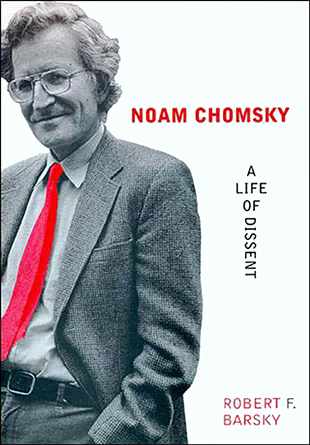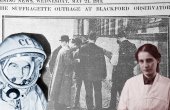How George Orwell Paved Noam Chomsky’s Path to Anarchism

Unlike the many members of the left who captivated him as a young man — such as Dwight Macdonald, George Orwell, and Bertrand Russell — Noam Chomsky himself did not come to left-libertarian or anarchist thinking as a result of his disillusionment with liberal thought. He quite literally started there. At a tender age, he had begun his search for information on contemporary left-libertarian movements, and did not abandon it. Among those figures he was drawn to, George Orwell is especially fascinating, both because of the impact that he had on a broad spectrum of society and the numerous contacts and acquaintances he had in the libertarian left. Chomsky refers to Orwell frequently in his political writings, and when one reads Orwell’s works, the reasons for his attraction to someone interested in the Spanish Civil War from an anarchist perspective become clear.

When Chomsky was in his teens he read Orwell’s “Animal Farm,” “which,” he told me in 1995, “struck me as amusing but pretty obvious”; but in his later teens he read “Homage to Catalonia” “and thought it outstanding (though he overdid the POUM role I felt, not surprisingly given where he was); it confirmed beliefs I already had about the Spanish Civil War.” “Homage to Catalonia,” Orwell’s description of the Spanish conflict, which he wrote after completing a stint as an active member of the POUM militia, is still a book to which people (including Chomsky) who are interested in successful socialist or anarchist movements refer, because it gives an accurate and moving description of a working libertarian society. The “beliefs” that it “confirmed” for the teenaged Chomsky were related to his growing conviction that libertarian societies could function and meet the needs of the individual and the collective.
There were three left-wing groups active on the scene in Barcelona during the 1930s: the Partido Obrero de Unificación Marxista, or POUM; the socialist PSUC (Partido Socialista Unificado de Catalunya), which was dominated by Stalinists; and the anarchist CNT-FAI (Confederación Nacional de Trabajadores-Federacion Anarquista Iberica), which honored Rudolf Rocker as “their teacher” on the occasion of his 80th birthday. Orwell joined the POUM militia at the end of 1936 as a means of entering Spain to write newspaper articles. His description, in “Homage to Catalonia,” of the POUM line sets up an oversimplified but provocative relationship between bourgeois democracy, fascism, and capitalism:
Bourgeois “democracy” is only another name for capitalism, and so is Fascism; to fight against Fascism on behalf of “democracy” is to fight against one form of capitalism on behalf of a second which is liable to turn into the first at any moment. The only real alternative to Fascism is workers’ control. If you set up any less goal than this, you will either hand the victory to Franco, or, at best, let in Fascism by the back door. The war and the revolution are inseparable.
Orwell maintains that revolution is the only way to remove from power the oppressive business-based ruling class of the type that has dominated the West since World War II. This concept is a difficult one to grasp for those of us who have been programmed, in large measure by the mainstream press, to think that battles must involve two opposing forces — one good and one evil. World War II is often portrayed this way: the Allied side is taken to represent freedom and democracy, while fascism and Nazism are considered synonymous with totalitarian oppression. Chomsky knew early on that there were other ways to conceive of contemporary political structures. He tended to lean towards the left-libertarian interpretation of events, and concluded that neither side deserved the support of those interested in a “good society.” How “good” is the society that drops atomic bombs on Japanese civilians, or reduces German towns to rubble? Isn’t there an alternative?
How “good” is the society that drops atomic bombs on Japanese civilians, or reduces German towns to rubble? Isn’t there an alternative?
This subject is still hotly debated, even among members of the libertarian left. Norman Epstein, who has been active in leftist movements for many years and who is otherwise generally sympathetic to Chomsky’s position, here dissents by taking exception to Orwell’s paraphrasing of the POUM line. He emphasizes that “fascism is not simply another name for capitalism. It is a form, and a particularly brutal one, which capitalism takes under certain historical circumstances (including today in many third world countries under the sponsorship of U.S. capital) which is different from bourgeois democracy. Someone like Chomsky is allowed to function under bourgeois democracy but not under fascism.” But we must recognize the similarities between a fascist agenda and that of the so-called democratic West if we are to understand where Chomsky is coming from in his political works, and to do so we have to engage with the anarchist position that he had begun to develop in his youth.
The most important point, perhaps, is that the anarchism of the type that reigned, in various degrees, in Barcelona in the 1930s, was not an anarchism of chaos, of random acts; it was not purely individualistic or hedonistic in character. When Chomsky considered the anarchist position as an alternative to the status quo, he may well have appealed to Orwell’s description, in “Homage to Catalonia,” of Barcelona in 1936. He refers to this passage on a number of occasions in his later works. Orwell begins by describing his arrival in the city, noting the physical changes that had been effected by the anarchists and the workers. Most of the buildings had been seized by the workers, churches had been gutted or demolished, there were no private motorcars or taxis, shops and cafes had been collectivized, and symbols of the revolution abounded. But it was the effect that this collectivization had upon the people that was most striking.
Waiters and shop-walkers looked you in the face and treated you as an equal. Servile and even ceremonial forms of speech had temporarily disappeared. Nobody said “Señor” or “Don” or even “Usted”; everyone called everyone else “Comrade” and “Thou,” and said “Salud!” instead of “Buenos dias.” … And it was the aspect of the crowds that was the queerest thing of all. In outward appearance it was a town in which the wealthy classes had practically ceased to exist. Except for a small number of women and foreigners there were no “welldressed” people at all. Practically everyone wore rough working-class clothes, or blue overalls or some variant of the militia uniform. All this was queer and moving. There was much in it that I didn’t understand, in some ways I did not even like it, but I recognized it immediately as a state of affairs worth fighting for.
But how does one achieve such a society? How did the young Chomsky explain to himself the great distance between his own world and the one about which he read in books such as “Homage to Catalonia”? And why didn’t he look to the Bolshevists rather than the anarchists?
The work of anarchist thinker Rudolf Rocker was a vital source of information and inspiration for him as he struggled to analyze these complex issues. Chomsky read Rocker’s work, including his book on the Spanish Civil War called “The Tragedy of Spain,” as a teenager. Rocker’s argument was that the Bolshevist rulers justified totalitarian practices by claiming to defend proletarian interests against counterrevolutionary actions. They were preparing society for socialism in accord with the teaching of Lenin. But Rocker’s claim, which is in line with Chomsky’s thinking, is that dictatorship and tyranny, even when couched in apparently libertarian ideology and objectives, can never lead to liberation. Says Rocker: “What the Russian autocrats and their supporters fear most is that the success of libertarian Socialism in Spain might prove to their blind followers that the much vaunted ‘necessity of dictatorship’ is nothing but one vast fraud which in Russia has led to the despotism of Stalin and is to serve today in Spain to help the counter-revolution to a victory over the revolution of the workers and the peasants.” The importance of the Spanish revolution is clear, for it served as a concrete example of how powers such as the Soviet Union and the United States, despite their apparent differences, did converge in their mutual fear of liberation movements. In this sense, apparent aberrations such as the Stalinist-Fascist pact that was signed on August 23, 1939, or the physical and verbal attacks made against the Spanish anarchists by both the Soviets and the Americans, make sense. The misrepresentation of events persists even today in standard historical texts.
Chomsky was fortunate to have made this connection early on, for it spared him from experiencing the disillusionment that ultimately afflicted many of his contemporaries. This sense of betrayal or surprise was very real for many members of Chomsky’s generation. His friend Seymour Melman, for example, described in a personal interview the important role that the Spanish Civil War played in revealing to him the Stalinist Fascist relationship and the so-called Communist hand:
We didn’t know the full role of the Communists until 1939 when this famous Russian general defected and wrote articles in the Saturday Evening Post. Therein he described in detail how Stalin was using his secret police to wage a war against the Anarchists. He described Stalin’s war within the war. He also described how the Stalinists stole the gold reserve of the Spanish Republic. He layed out a detailed analysis and prediction of the Nazi-Soviet pact.
Notice the time lag between the events of 1936 and the realization that the Soviets were “wag[ing] a war against the Anarchists.” Even more remarkable, of course, is that the generally accepted view, subsequently perpetrated by the Western press, was that the Spanish Civil War was a colossal failure, and had achieved no concrete results. It was branded as a failure of socialist, anarchist, or Marxist principles, depending upon who was doing the branding.
Orwell had noted, in “Homage to Catalonia,” the obvious schism between the events as they occurred and as they were reported, and pointed to the way in which media types and intellectuals tended to dismiss anti-status-quo movements, such as socialism, by distorting the principles that supported them or the movements that grew from them: “I am well aware that it is now the fashion to deny that Socialism has anything to do with equality. In every country of the world a huge tribe of party-hacks and sleek little professors are busy ‘proving’ that socialism means no more than a planned state-capitalism with the grab-motive left intact. But fortunately there also exists a vision of Socialism quite different from this.”
This is the crux of the matter; other visions did exist, and Chomsky had access to them as a young man. But it did take a certain amount of effort to uncover them, unless one was fortunate enough to have participated directly in events of the time, as Orwell was. “[I]t was here that those few months in the POUM militia were valuable to me,” he writes. “For the Spanish militias, while they lasted, were a sort of microcosm of a classless society. In that community where no one was on the make, where there was a shortage of everything but no privilege and no boot-licking, one got, perhaps, a crude forecast of what the opening stages of Socialism might be like. And, after all, instead of disillusioning me it deeply attracted me.”
Robert F. Barsky is a 2023 Guggenheim Fellow & Professor at Vanderbilt University. He has published widely in language theory, literary studies, and border studies with an emphasis on humanistic approaches to human rights. He is the author of several books, including “The Chomsky Effect: A Radical Works Beyond the Ivory Tower” and “Noam Chomsky: A Life of Dissent,” from which this article is excerpted.



